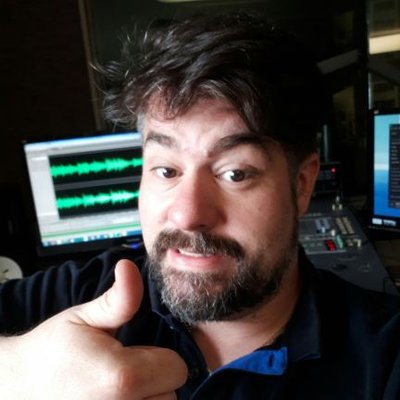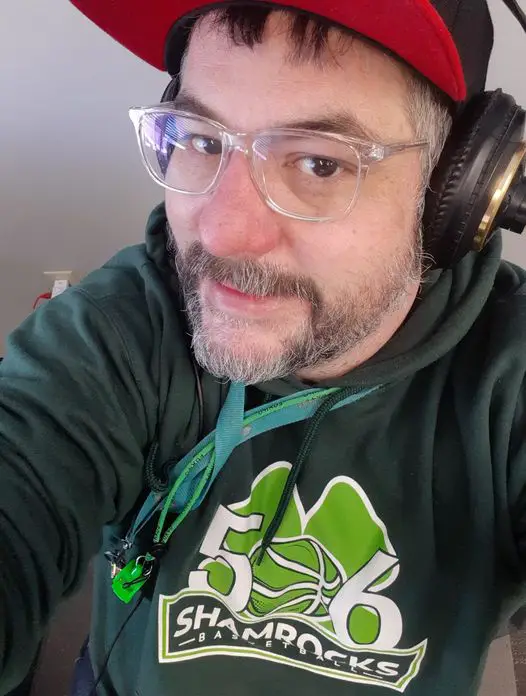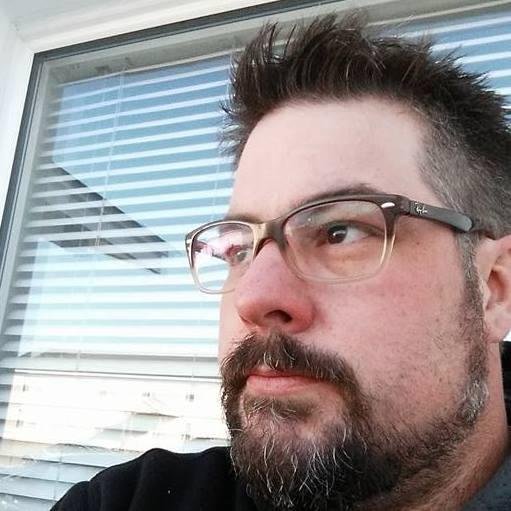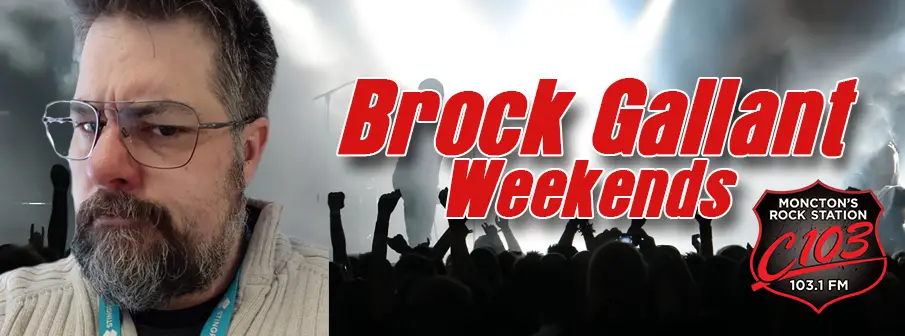All images courtesy of Brock Gallant

A couple of months back, Brock Gallant reached out to me via email and let me know that he enjoyed what we were doing and that he would like to feature us from time to time on his Rock Report, which runs during his show on FM Radio station Q103.1 Moncton. I was relatively taken aback, and was truly ecstatic when Brock did feature us on his Rock Report the very next day. Having a friend in radio is a pretty cool thing.
Naturally, I asked Brock if he would like to be interviewed, and he graciously accepted. So, today I’ve got the fruits of Brock’s labor. This is a truly cool one for me, as it’s another example of the interesting journey that the world of journalism has me on. I’ve met a lot of interesting people, artists, and peers, and for that, I’m truly thankful.
It’s my pleasure to present my chat with Brock Gallant. We touch on Brock’s entry into music, the drums and radio, his opinions on the state of the industry and FM Radio, and his truly engaging tale from his days on tour. If you would like to learn more about Brock, check out his show via Q103.1 Moncton. Enjoy this one. Cheers.
Andrew:
Brock, thank you for taking the time to speak with us. It’s been a weird year. How have you been holding up during this seemingly ever-raging dumpster fire?
Brock:
Luckily I live in a part of Canada that has done very well at keeping things under control. Our caseload right now is under 50 and all things considered, I’ve been very lucky. Now that I’m back behind the mic for the radio station, my work is deemed essential, and I haven’t had to endure very much lock downtime. You can start hating me now.
Andrew:
Tell us your backstory. How did you get into music? What was the gateway, so to speak?
Brock:
I started playing music in the 7th grade as a part of the school band. Still to this day, I wish I could play in a big band; it was and still is the music I enjoy most. I moved from that town (Grand Falls, NB) to a larger city (Moncton, NB) and managed to work myself into the school band in my new home, but it just wasn’t the same. There wasn’t the same drive with this band. So I began looking for other ways to play. It wasn’t long before I found myself a self-proclaimed “Jazz” drummer playing in Punk bands covering Avail, Face to Face, Screeching Weasel, and more. Once I got a taste of that, it was over. Playing music for money was never the goal; I just wanted to make music, I wanted it loud and fast, and to be constantly pushing the threshold of my playing. That led to my playing in a Punk/Rockabilly band called The Treble Kings.
We played mostly local gigs opening for bands like The Brains, Gutter Demons, and any other like-minded bands we found that were passing through our territory. Around that time, some friends I had worked with in the past on a Disco project were now forming the backing band to a Country singer named Jason Haywood. I had never considered Country music as an option for me, but I didn’t want to turn down the opportunity to play with some of my favorite players (Bass Player, “Turtle” Denis Aresenault and Guitarist Alex Madsen). What started as a project covering Johnny Cash tunes quickly turned into an album, a tour and one of the most defining moments of my musical career. I’ll get to that a bit later.
Andrew:
How about radio? What drew you in there? How did you get your start in that world?
Brock:
Music and Media have always been my forms of expression. As hard as I worked at being a musician, I never believed I had the chops to make it as a pro-player, so I devised a plan of breaking into Television – hoping to one day join the ranks of Much Music, Canada’s answer to MTV. We were still in an era of VJ’s, TRL, and music still being the “core” of music television programming. I volunteered at my local cable access channel and began learning everything I could. I believed that the part of my “game” that needed the most work was writing my own stories, so I enrolled in the Broadcast Journalism program at Loyalist College in Belleville, ON.
I had never considered Radio as an option until I was asked to co-host the “Gumbo” show on CJLX. The show was basically me and host “Roxy” digging through the pile of rejected music at the radio station. We were looking for anything new, exciting, and dangerous. I distinctly remember one night, pulling the cellophane off a CD case and slapping it into the player with just enough time to hit play on a song we had never heard, “Faith” by Limp Bizkit. No one was playing the song yet. And this was the key. We wanted to play what was getting ignored. It’s not like being the first to play a Beatles song; it’s not historic, but it was fun, it was thrilling, and it was what got me going in the direction that led me to where I am today.
I had the chance to go to Much Music as an intern, but I passed on it and came home to do my work term with C103 (Now Q103). The week after my internship was over, I was offered a full-time job, and I never looked back.

Andrew:
Speaking of radio, you’re with 103 Moncton. How did you get the gig there? What’s the experience been like? Any special moments that stand out?
Brock:
My first job in radio was as a reporter. Through the years I have interviewed Canadian Prime Minister Jean Chretien, UN Secretary-General Boutros Boutros-Ghali and more political types, but honestly the interviews I loved most were with musicians like Noodles of Offspring, Cone of Sum 41, Bret Michaels, Matt Good, and Hugh Dylan of the Headstones. At one point, I thought I was leaving radio for good, but after 10 years of working with the band, a young child at home, and a wife that wanted to see me home again, getting the chance to “fall back” on what I always intended to “fall back” on was a blessing.
The early portion of my career was very informative but where I’m at now is definitely the most fun I’ve ever had in any job.
Andrew:
You’re a musician yourself as well. Tell us more about your musical pursuits outside of radio.
Brock:
I eluded to a story that needed to be told when talking about my music earlier. The story of The Divorcees is certainly unique and by far had the most impact on shaping me as a human being. After wrapping up recording on our first album You Ain’t Gettin’ My Country, I booked a cross-Canada tour for the band. 18-shows over 4 weeks from Moncton to Vancouver and back. Everyone packed up and we set out on the tour. Months of planning had gone into this, and for all of us, this would be our first major tour. About 4 hours into the drive to the first show our lead singer, Jason, decided he wasn’t up for it and he decided to leave the band by placing a note on the windshield of the band van and abandoning us at a truck stop near the New Brunswick/Quebec boarder. He hid in some nearby woods and watched the band meltdown in the parking lot. After we left, he took a cab to the nearest town and holed up in a hotel.
The remaining 3 members of the band returned to Moncton to regroup and decide our fate. We realized that if we cancelled this tour and these shows, there would never be another tour. No one would book us again after this. So, Denis, Alex, and myself got back in the van and did the tour as a 3-piece. Every day, we would stop at the Public Library in whichever town we were in, and we would download song lyrics for Alex to learn. Each night, we would work those songs into the set, expanding our show nightly as we worked our way West. We knew we needed to get the show back to 4 X 45-minute sets since we had a 3-night anchor gig booked in Medicine Hat. If we couldn’t pull off that gig, the entire budget for the tour would be ruined, and we’d be in some deep financial trouble. At the same time, we were actively dealing with media requests from our hometown since word got out; we were touring under exceptional circumstances. We continued to talk to Jason in hopes we could fly him out to meet us and continue the tour. That never happened. As we took the stage in Medicine Hat, it was clear we were in it deep. The bar held 1600 people, and the stage was elevated above the bar, so ALL EYES WERE ON US.
The owner knew something was up on day 1, and by night two, he had found us another guitar player to sit in for the remaining two days. We survived the weekend, but the damage was done, and we never played Medicine Hat again. By this point, the band was nearly over. We were beaten down, ego bruised, and running low on money and energy. The very next show continued the humbling as we played a gig at the Railway Club jammed in between a “Book Reading” and performance by B.A. Johnston (Look him up if you don’t know him). Completely disheartened, we had one show left. A Sunday night show, for no money, at a place in Calgary called a “Bar Named Sue” – https://www.youtube.com/watch?v=1im1Sjc8OP0.This show, this song, this moment galvanized the band. We finally saw there was hope, there was an audience, and we pushed on. If it were not for that show, the band would have packed it in and been done for good.
Andrew:
I believe you’re a drummer. I play drums myself. What is it about the drums you love most? Who are some of your favorite drummers, and why? What type of drums, cymbals, and hardware are you using?
Brock:
My brother played drums, so I wanted to play drums. I owned a guitar, but drums were what I wanted.
Favorite Drummers: Buddy Rich, Carter Beauford, Dave Weckl.
Sabian Cymbals are from my home province of NB. Naturally, I use those. Los Cabos Drum Sticks: Another New Brunswick product. Gretsch Drums: Catalina Club or Yamaha. I prefer mahogany to maple, which has kept things cheap for me on the gear acquisition side. At one point, I was touring with an 18” bass drum, snare, floor tom, ride, crash, and hi-hats. I like to keep it simple.

Andrew:
As both a broadcaster, journalist, and musician, who are your biggest influences? How do the three come together to form your proverbial musical whole?
Brock:
I love my job today. Talking about music, finding and presenting current events… that’s all I could ask for. I know that it won’t last, but that’s true of anything. Nothing lasts, have fun while you’re able.
Andrew:
In a world that has become so defined by social media and big business, what’s the state of the music industry these days? What’s the landscape out there?
Brock:
If you say what’s the state of any “Industry” these days, it’s clear the answer is normally “in trouble.” Music is fine. It’s thriving. Making money from it is what is in trouble. Rockstar is not a real thing anymore. I doubt it ever was. The dream of signing a contract side stage and getting on to a big bus, that’s long gone for me. Success in music requires a lot of work, and at my age, I’m not prepared to do what it takes. That being said, I feel it’s still possible; it’s viable IF YOU PUT IN THE WORK. There are millions of athletes that never make it to the stage of financial security; musicians should expect the same. It’s rarefied air, and if you’re willing to work for it and make some sacrifices, it can pay off. But working ONLY for the payoff rarely ever works in anything.
Andrew:
FM radio is interesting. It’s still important, but the entire scope has changed in a way, right? Streaming is king now, and I often wonder what the future for old-school FM radio holds. In your opinion, does radio still hold the same value as it once did?
Brock:
Live it up now. The days of “free music” are coming to an end. There will come a day when all the free over the air content is gone. The consumer has led that charge. One day it will no longer be viable to keep the transmitters on, the shows will move to streaming, and that will be that. The artists will feel the pain the most. Radio is a cash cow for royalty holders, and when it’s gone, people will wonder why… but it’s solely based on consumer usage, so the only one to blame is the listener.

Andrew:
Aside from music, what else are you most passionate about and why? How do your other passions inform and inspire your musical pursuits?
Brock:
My number one passion right now is coaching basketball. I have two teams, one for kids Under 12 and one for kids under 14. The energy and enthusiasm that fueled my passion for music are now focused on working with youth. My program is not about creating elite athletes; the focus is on developing well-rounded, healthy HUMANS. Sport is a great forum for learning lots about life, and much of my free time and energy is focused there.
Andrew:
Are you into vinyl? Tapes? CDs? Or are you all digital now? Where do you like to shop for music? What are a few albums that mean the most to you and why?
Brock:
I’m not an audiophile; it’s about the content of the music. So radio, streaming, it does not matter to me how I get it. The “format” is too entrenched with social status for me to care. If you had a CD player in 1989, you were cutting edge; now it’s TAPES? The romanticizing of old formats is something I used to do. I had reel to reel and 8-tracks, but if I’m honest, there was no real reason to have them other than the “Cool” factor. Music has lost so much “Cool” for me that I can’t even bother to list a genre I like most…like Ray Charles said, there are two kinds of music…Good and Bad. That’s where I’m at these days.
Andrew:
You’re a big Rock guy. That said, what does Rock music mean to you? How would you define its significance in your life? Are you into other genres as well? What are some of your favorite albums?
Brock:
In order of appearance: Fav Bands or Genres NKOTB – I liked a girl, I stand by this decision. Rap – Arrested Development, Wrex n’ Effect, Naughty By Nature, KISH, Maestro Fresh Wes, Michy Mee, The Dream Warriors. Rap Rock – Rage and the pretenders that followed, but #1 will always be Anthrax and Public Enemy. Jazz – Big Band especially. Crooners, Frank, Tony, Mel. Jam Bands: This was my fusion era. Country: Cash, Waylon, Willie, The Outlaws. Then I drifted and stopped caring. I listen to Christian Rap at basketball practice because it normally has a solid message without the need for editing. I’m a genre-less music lover these days. And it took a great deal of confidence to get there. In my youth, I’d disavow liking a band if I thought it was uncool. Not so much anymore.
Andrew:
On the subject of COVID’s effect on things, where has it left the music scene? So many indie venues are closing, and people are struggling. Do we recover from this? If so, how?
Brock:
I wish I knew. Music will never die, but how musicians survive will be an evolutionary process. If history teaches me anything about technology, look to the sex industries. An only-fans of music may be the future, actually… SoundCloud is already moving that way now.
Andrew:
Last question. You’ve had a successful and multi-layered career thus far. With that being said, as a veteran of “the scene,” what advice would you have for young artists looking to take the plunge?
Brock:
This is so cliché. Do it for the love. I booked a venue for many years called Plan B. A young musician asked me, “How long before I can start making money at music?” I looked at his two amps, his Gibson and Fenders all totaling about $10,000 in gear. I said “Sadly, if you sell all your gear today, in 5 years you’d still be more profitable than if you keep them and keep playing.” It wasn’t an indictment of his skill, rather an indictment on the industry. If you have “IT” you’ll make it. Again…it’s rarefied air. That doesn’t mean you don’t try, just know the risks and be prepared to adapt. You do not get to choose the terms of your success. So, along the way, remember to accept help from those who have your best interests at heart.

Dig this interview? Check out the full archives of Vinyl Writer Interviews, by Andrew Daly, here: www.vinylwritermusic.com/interview





Leave a Reply